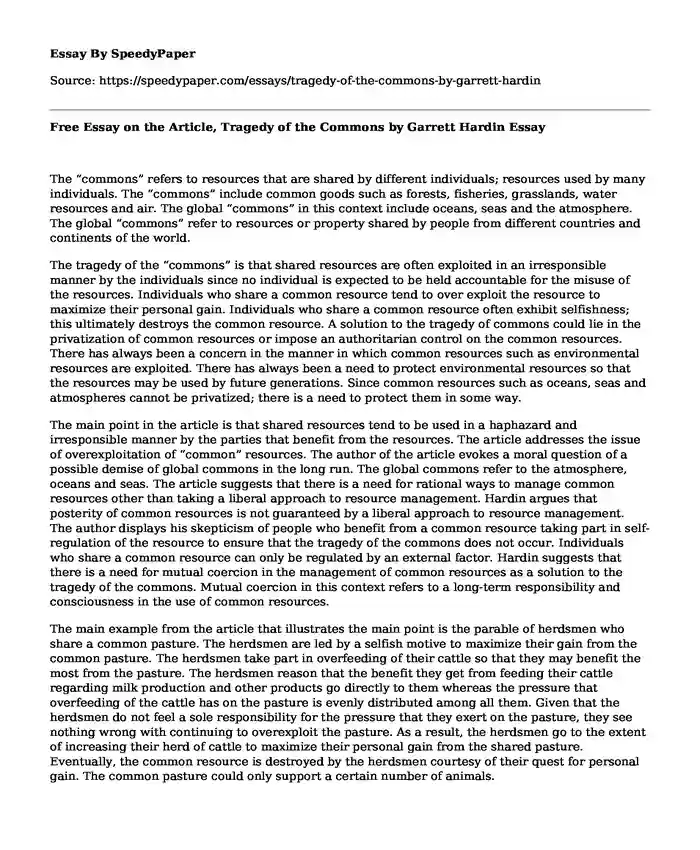The “commons” refers to resources that are shared by different individuals; resources used by many individuals. The “commons” include common goods such as forests, fisheries, grasslands, water resources and air. The global “commons” in this context include oceans, seas and the atmosphere. The global “commons” refer to resources or property shared by people from different countries and continents of the world.
The tragedy of the “commons” is that shared resources are often exploited in an irresponsible manner by the individuals since no individual is expected to be held accountable for the misuse of the resources. Individuals who share a common resource tend to over exploit the resource to maximize their personal gain. Individuals who share a common resource often exhibit selfishness; this ultimately destroys the common resource. A solution to the tragedy of commons could lie in the privatization of common resources or impose an authoritarian control on the common resources. There has always been a concern in the manner in which common resources such as environmental resources are exploited. There has always been a need to protect environmental resources so that the resources may be used by future generations. Since common resources such as oceans, seas and atmospheres cannot be privatized; there is a need to protect them in some way.
The main point in the article is that shared resources tend to be used in a haphazard and irresponsible manner by the parties that benefit from the resources. The article addresses the issue of overexploitation of “common” resources. The author of the article evokes a moral question of a possible demise of global commons in the long run. The global commons refer to the atmosphere, oceans and seas. The article suggests that there is a need for rational ways to manage common resources other than taking a liberal approach to resource management. Hardin argues that posterity of common resources is not guaranteed by a liberal approach to resource management. The author displays his skepticism of people who benefit from a common resource taking part in self- regulation of the resource to ensure that the tragedy of the commons does not occur. Individuals who share a common resource can only be regulated by an external factor. Hardin suggests that there is a need for mutual coercion in the management of common resources as a solution to the tragedy of the commons. Mutual coercion in this context refers to a long-term responsibility and consciousness in the use of common resources.
The main example from the article that illustrates the main point is the parable of herdsmen who share a common pasture. The herdsmen are led by a selfish motive to maximize their gain from the common pasture. The herdsmen take part in overfeeding of their cattle so that they may benefit the most from the pasture. The herdsmen reason that the benefit they get from feeding their cattle regarding milk production and other products go directly to them whereas the pressure that overfeeding of the cattle has on the pasture is evenly distributed among all them. Given that the herdsmen do not feel a sole responsibility for the pressure that they exert on the pasture, they see nothing wrong with continuing to overexploit the pasture. As a result, the herdsmen go to the extent of increasing their herd of cattle to maximize their personal gain from the shared pasture. Eventually, the common resource is destroyed by the herdsmen courtesy of their quest for personal gain. The common pasture could only support a certain number of animals.
Reference
Hardin, G. (1968). The Tragedy of the Commons. Washington, D.C.: American Association for the Advancement of Science.
Cite this page
Free Essay on the Article, Tragedy of the Commons by Garrett Hardin. (2017, Oct 24). Retrieved from https://speedypaper.net/essays/tragedy-of-the-commons-by-garrett-hardin
Request Removal
If you are the original author of this essay and no longer wish to have it published on the SpeedyPaper website, please click below to request its removal:
- Cultural Differences in Decision-Making, Free Essay Sample
- Free Paper: Observational Research Report on McDonald's Restaurants
- Essay Example on The Beginning of Slavery in America
- IT Revolutionizing Business: Impact of High-Speed Internet & ICTs
- Research Paper on Preventing Diabetes Among Elementary Students
- Paper Example - Health Reform Bill
- Paper Example. Latest Progress in Cancer Immune Escape
Popular categories





